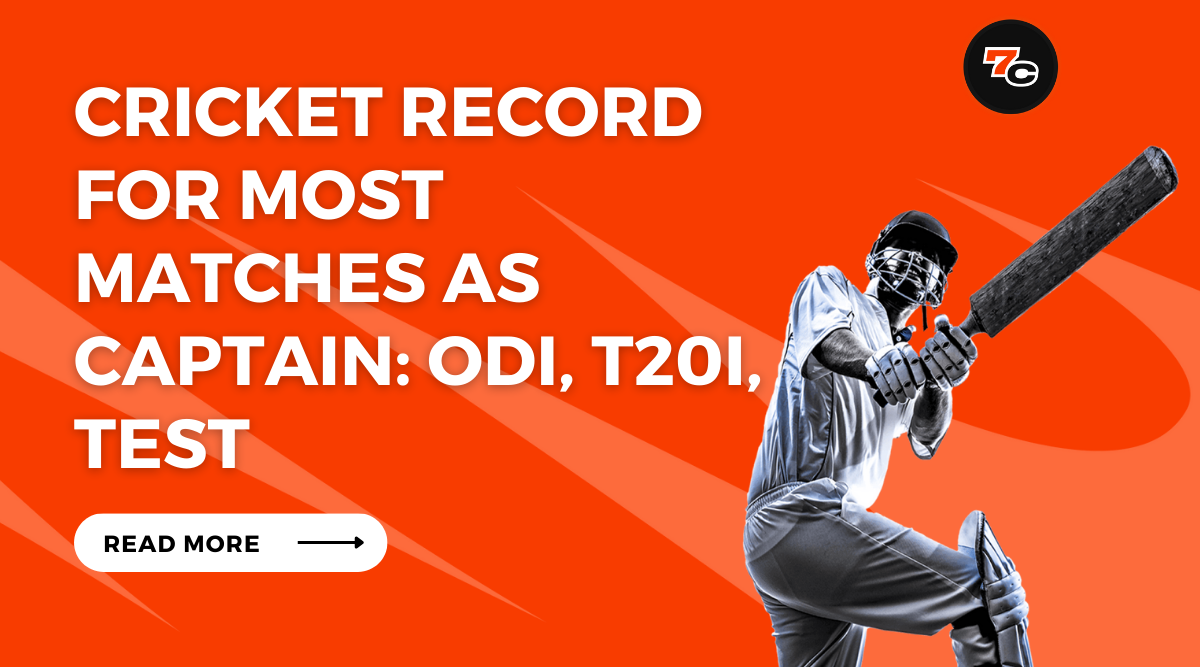
Cricket, a realm where strategy and skill dance in a delicate ballet, often places the weight of victory on the shoulders of a singular figure: the captain.
Steering the ship through turbulent waters, a captain’s role transcends the boundaries of mere game strategy; it’s about kindling the flames of passion within a team.
When a captain etches their name in the annals of cricket history by leading in the most matches as captain, it’s a glowing endorsement of their steadfast leadership and the unwavering trust bestowed upon them.
ODI: The Perfect Blend of Pace and Strategy
Navigating the realm of One-Day Internationals (ODIs) is like dancing on a tightrope. It’s where the endurance of Test cricket meets the fervor of T20.
In this arena, a captain’s prowess is under the spotlight, every move scrutinized. To hold the record for the most matches as captain in ODIs?
That’s akin to mastering this intricate dance. It’s a testament to unwavering consistency, remarkable adaptability, and an innate knack for thriving under pressure.
1. RT Ponting (AUS/ICC): A Decade of Dominance
Leading from the front between 2002 and 2012, Ricky Ponting captained in a whopping 230 matches. With a staggering 165 wins under his belt, he boasts a win percentage of 71.73%.
His leadership saw Australia clinch numerous titles, making him one of the most successful captains with a W/L ratio of 3.23.
2. SP Fleming (NZ): New Zealand’s Beacon
Stephen Fleming, who captained New Zealand from 1997 to 2007, holds the record for the second most matches as captain with 218 games.
While his win percentage stands at 44.95%, his calm and composed leadership style was a hallmark of New Zealand cricket during his tenure.
3. MS Dhoni (IND): The Calm Tactician
MS Dhoni, India’s captain cool, led the team in 200 matches from 2007 to 2018. With a win percentage of 55.00%, Dhoni’s tactical brilliance and unflappable demeanor made him one of the most revered captains in the game.
His record of most matches as captain for India in ODIs is a testament to his lasting impact.
4. A Ranatunga (SL): Sri Lanka’s Pillar
Arjuna Ranatunga, who captained Sri Lanka between 1988 and 1999, is fourth on the list with 193 matches. With a closely contested win and loss record, his win percentage stands at 46.11%.
Ranatunga’s leadership was instrumental in shaping Sri Lankan cricket during its formative years in the international arena.
5. AR Border (AUS): Australia’s Stalwart
Allan Border, one of Australia’s legendary cricketers, captained the side in 178 matches from 1985 to 1994.
With a commendable win percentage of 60.11%, Border’s leadership was characterized by grit and determination, laying the foundation for Australia’s future successes.
T20i: Cricket’s Electrifying Dash
T20 internationals, often dubbed T20i, mirror the intensity of a heart-pounding race. In this arena, every second and strategy is magnified. For the captain, it’s like navigating a storm, where agility of mind meets swift action.
Holding the helm in the most matches as captain in T20i isn’t just about leadership; it’s about mastering the dance of split-second choices.
1. AJ Finch (AUS)
Leading the Australian side from 2014 to 2022, AJ Finch has captained in 76 matches. With a win-loss ratio of 1.25, Finch has managed to secure victories in 52.63% of the games he’s led, making him a formidable leader in the T20I arena.
His tenure saw Australia clinch 40 wins, with only 32 losses, a tied match, and three games with no result.
2. MS Dhoni (IND)
MS Dhoni, India’s iconic captain, led the team in 72 T20I matches from 2007 to 2016. With a commendable win-loss ratio of 1.46, Dhoni’s captaincy witnessed India winning 56.94% of the matches.
Under his leadership, India secured 41 wins, faced 28 losses, tied a game, and had two matches with no result.
3. EJG Morgan (ENG)
EJG Morgan, the English skipper, has also captained in 72 T20I matches, spanning from 2012 to 2022.
With a win-loss ratio of 1.55, Morgan’s leadership skills have shone brightly, leading England to victory in 58.33% of the matches.
His captaincy record boasts 42 wins, 27 losses, two tied matches, and a single game with no result.
4. Babar Azam (PAK)
Babar Azam, Pakistan’s current captain, has led the team in 71 T20I matches from 2019 to 2023.
With an impressive win-loss ratio of 1.82, Azam has steered Pakistan to win 59.15% of the matches under his leadership. His tenure has seen Pakistan achieve 42 wins, endure 23 losses, and six matches with no result.
5. KS Williamson (NZ)
KS Williamson, New Zealand’s calm and composed leader, captained the Kiwi side in 69 T20I matches from 2012 to 2022.
With a win-loss ratio of 1.09, Williamson’s leadership resulted in New Zealand winning 50.72% of the matches. Under his guidance, the team secured 35 wins, faced 32 losses, tied a game, and had one match with no result.
Test: The Ultimate Test of Endurance
Test cricket, the grand old format, is often likened to a marathon, unfolding over five days in a theatre of patience, strategy, and endurance.
It’s a realm where every over is a story, every session a chapter, and every day an epic in its own right.
The captain stands as the central character in this unfolding narrative, orchestrating the moves, facing the music, and steering the ship through calm and storm alike.
In this enduring format, to captain a side is to embrace a challenge that is as mental as it is physical. It’s about reading the game, the opposition, and one’s own troops.
It’s about knowing when to attack, when to defend, and when to bide time. The role of a captain in Test cricket is a blend of a strategist, a motivator, and a warrior, all rolled into one.
Now, imagine holding the helm for the most matches as captain in this demanding format. It’s a journey of resilience, of an evolving understanding of the game’s intricacies, and of a relentless pursuit of excellence.
Those who’ve etched their names in the annals by captaining the most matches have not just led teams, but have carried the hopes and aspirations of nations.
1. GC Smith (ICC/SA)
Spanning from 2003 to 2014, GC Smith has the distinction of leading in 109 Test matches. With a commendable win rate of 48.62%, Smith has won 53 matches and lost 29.
His tenure saw no tied matches, with 27 ending in a draw. Smith’s leadership prowess is evident with a win/loss ratio of 1.82, making him a standout in the realm of most matches as captain.
2. AR Border (AUS)
From 1984 to 1994, AR Border captained the Australian side in 93 Test matches. He secured victories in 32 matches, with a win rate of 34.40%.
Border’s era witnessed a single tied match, a rarity in Test cricket. With 38 matches ending in a draw, his win/loss ratio stands at 1.45.
3. SP Fleming (NZ)
Leading the New Zealand side between 1997 and 2006, SP Fleming captained in 80 Test matches. He boasts a win rate of 35.00%, having won 28 matches and lost 27.
Under his leadership, no matches ended in a tie, and 25 matches concluded as draws. Fleming’s win/loss ratio is 1.03, reflecting his balanced approach to the most matches as captain.
4. RT Ponting (AUS)
Ponting, another Australian legend, captained from 2004 to 2010. In 77 Test matches, he led his team to victory in 48, showcasing an impressive win rate of 62.33%.
With 16 losses and 13 draws, Ponting’s win/loss ratio is a remarkable 3.00, underscoring his dominance in the most matches as captain.
5. CH Lloyd (WI)
The West Indies saw CH Lloyd’s leadership from 1974 to 1985. In 74 Test matches, Lloyd secured 36 victories, translating to a win rate of 48.64%.
With 12 losses and 26 draws, his win/loss ratio mirrors Ponting’s at 3.00, marking his significant impact in the list of most matches as captain.
Conclusion: A Legacy Carved Through Leadership
The game of cricket presents its leaders with a one-of-a-kind battleground where strategy and skill dance to the beat of loud applause.
Being the captain who has led their team in the most games is more than just a feat of endurance; it’s a testament to leadership, flexibility, and a genuine passion for the sport.
Those who achieve this feat are more than just team leaders; they leave indelible marks on history. We applaud these veterans as true believers in this great sport.
Their careers, highlighted by the most matches led, are more than simply records; they are also legacies that will live on in cricket’s history and encourage future leaders to dream big and take charge.









